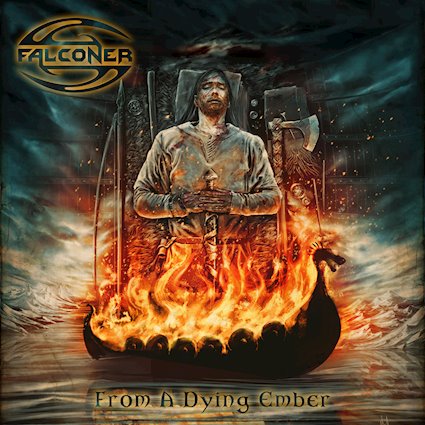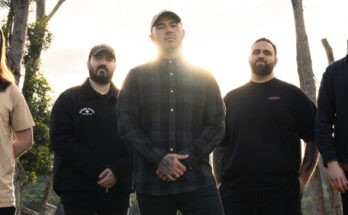Sweden’s Falconer was born out of the ashes of Mithotyn, who split-up in 1999. After disbanding, one of Mithotyn‘s founding members – Stefan Weinerhall (guitar) – had a demo for a solo project, which eventually led to the creation of Falconer. Stefan was soon joined by Karsten Larsson (drums; also of Mithotyn); then, their friend Mathias Blad (vocals) came on board in 2000. This trio delivered the debut album Falconer in March 2001. From the beginning, the band planned not to perform live, but with the success of the album (many leading magazines named them “newcomer of the year”!), the offers came in.
Their sophomore album, 2002’s Chapters From A Vale Forlorn, featured the hit single “The Clarion Call”. Although the media and fans loved the album, some problems were happening within the band. Mathias had a tight schedule at work and couldn’t give Falconer the time needed to take on all of the live shows that they were offered. As a result, Mathias amicably left Falconer in late 2002; Kristoffer Göbel replaced him, and in November 2003, the new album Sceptre of Deception was released. After its release, the band embarked on a small tour of Europe.

In May 2005, Grime Vs. Grandeur was released – the first album for newcomers Jimmy Hedlund (guitars) and Magnus Linhardt (bass). It wasn’t the typical Falconer album; it was harder and more mainstream than before, and many thought that it didn’t fit under the Falconer moniker.
As the song-writing for a next album progressed, folk music and epic metal found its way back into the band’s style even more. They felt that to do this material justice, it had to be sung by former member Mathias Blad, who re-joined them in November 2005. However, this meant that Falconer was once again mainly a studio band who occasionally appeared at festivals only.
Northwind (2006) followed, and the band performed at select festivals in Europe in support of it. The next album, Among Beggars And Thieves, was released in 2008, and consisted of more progressive material.
In 2011, Armod was released, and it was the first album entirely sung in Swedish to highlight the folk elements in the music. This time around, no gigs were performed, and the band went into hiatus for a few years before returning with a newfound hunger.
Produced by Andy LaRocque (who recorded all previous Falconer albums), 2014’s Black Moon Rising is the group’s fastest, most guitar-oriented, riff-filled album to-date. The response from critics and fans turned out to be better than in previous years; as a result, the band decided to perform live once again, but for the last time. Their final tour dates were during this record campaign, concluding at ProgPower USA in Atlanta, GA in 2015.
Before song-writing began for the follow-up to Black Moon Rising, the band took some time off. Stefan Weinerhall decided not to rush the writing process, but rather take an extra year just to make sure the written material would be of the utmost quality. Some of the earlier material was scrapped and re-written halfway into the process; additionally, Stefan re-wrote one song with his old Mithotyn bandmate, Karl Beckmann (guitars/keyboards). The echoes from Mithotyn are surely noticeable on the track “Rapture”.
Stefan adds: “Finally, we got the chance to incorporate some keyed fiddle and bagpipe into the music – something that has always been a wish from us, just to get that extra medieval and folky feel to it. In that time, we also wrote the most intense ballad ever, which turned out to be ‘Rejoice The Adorned’ – only featuring piano, keys and strings.”
Mixed and mastered by Andy LaRocque, From A Dying Ember was also recorded at LaRocque’s Sonic Train Studio. Stefan concludes: “To sum the album up, we can say that ‘From A Dying Ember’ has some things that really stand out from a usual Falconer album. A lot of things happening and more elements to the music than ever before!”


